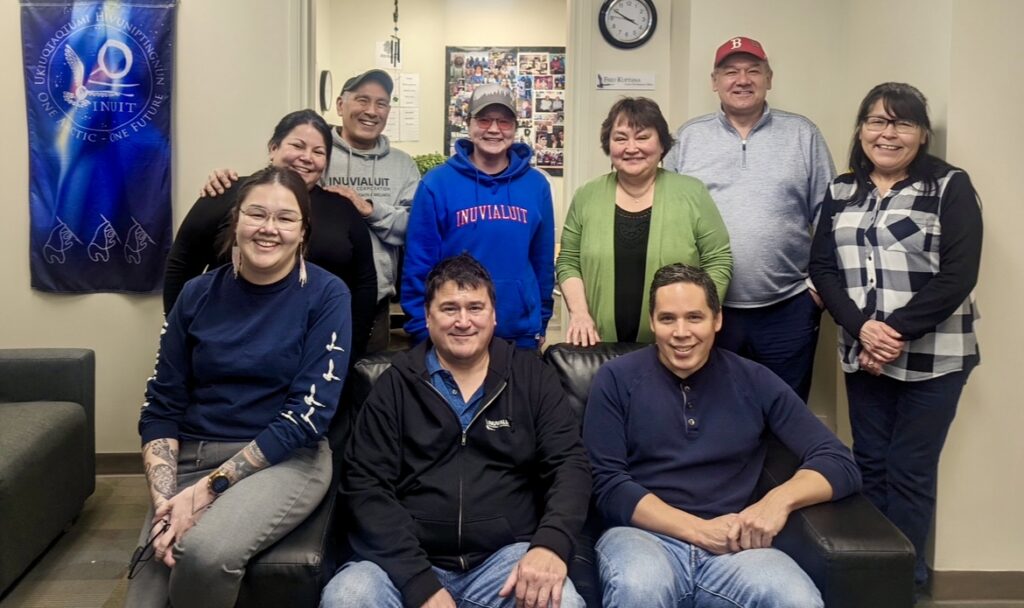 Executive Summary
Executive Summary
The Inuvialuit Regional Corporation (IRC) is responsible for the creation of economic opportunities, including labour market and capacity training, in the Inuvialuit Settlement Region. These opportunities “enable Inuvialuit to be equal and meaningful participants in the northern and national economy and society,” as prescribed by the Inuvialuit Final Agreement.
To improve the Inuvialuit Settlement Region’s beneficiary database system to better manage its support of approximately 7,000 Inuvialuit across and beyond the region, the IRC set out to survey community members on their backgrounds, knowledge, skills and abilities, educational and vocational specialties, and cultural and language skills. The IRC also invited each beneficiary to submit a copy of their resume. The IRC had hoped that this effort would allow the regional corporation to fill roles and identify gaps that could be addressed through their provision of education and training.
To date, 600 participants from Aklavik, Inuvik, Paulatuk, Sachs Harbour, Tuktoyaktuk and Ulukhaktok have participated in the survey. Despite delays in getting started on the surveying, project staff have benefitted from the face-to-face engagements with community members, which have allowed the IRC to integrate regional priorities into their programs and planning.
Initiatives like the Inuvialuit Energy Security Project present opportunities for employment during construction and long-term operations. Ongoing collection of beneficiary information related to education and skills increase the ability of the IRC to match job requirements with potential candidates, furthering economic, social and cultural well-being of Inuvialuit.
Key Insights
Participants were eager to share their experiences and feedback on life in the Inuvialuit Settlement Region, including and beyond education, skills and training.
To date, the Inuvialuit Skills Matrix includes 600 responses, representing approximately 1,200 hours of face-to-face interactions.
Funders need to integrate more flexibility, longer timelines and bigger budgets into their funding of projects in the North.
 The Issue
The Issue
Inuvialuit means “the real people” and describes the descendants of the Thule people who settled on the edge of the Beaufort Sea, at the mouth of the Mackenzie River, more than 800 years ago. Today, most Inuvialuit live in the Inuvialuit Settlement Region of the western Canadian Arctic, in the communities of Aklavik, Inuvik, Paulatuk, Sachs Harbour, Tuktoyaktuk and Ulukhaktok, in the Northwest Territories.
The IRC was created in 1984 to represent the economic, social and cultural well-being of Inuvialuit through the application of one of Canada’s oldest land claim treaties: the Inuvialuit Final Agreement. The IRC’s strategic priorities include the protection of land and culture, provision of services and creation of economic opportunities, including labour market and capacity training in the communities. One of the core principles of the Inuvialuit Final Agreement is “to enable Inuvialuit to be equal and meaningful participants in the northern and national economy and society.”
Indigenous communities face major barriers to education, training and employment opportunities, and the unique experience of Inuvialuit in the Inuvialuit Settlement Region is further complicated by geography, distance to service providers, food insecurity and telecommunications challenges. For these reasons, the IRC prioritizes opportunities for Inuvialuit to remain in the Inuvialuit Settlement Region for education, training and employment, reflecting the desires of Inuvialuit themselves. Leaving the community and region in pursuit of education, training and employment can lead to housing insecurity, as people are forced to give up public housing while away and are put on a waitlist when they wish to return. This can also lead to fractures in family units, undermining well-being for households and communities.
In 2021, the IRC began to create a beneficiary database system to better manage its support of approximately 7,000 Inuvialuit across the Inuvialuit Settlement Region and beyond. As this work progressed, the IRC recognized a major gap in its beneficiary data related to skills, employment and education. Without this information, the IRC faced challenges both in its own hiring practices, which prioritize the employment of participants, and in creating tailored support for education and training that could help Inuvialuit find employment elsewhere in the region.
A complicating factor in filling this gap is that many Inuvialuit do not have certificates, licenses or professionalized credentials to indicate skills, experiences and knowledge. Their informal connections and lived experiences, which are so vital to getting things done in the North, are not easy to inventory and align with more formalized skills needs.

 What We Investigated
What We Investigated
Seeking to augment its database, this project sought to create the first inventory of Inuvialuit employment, skills, training, Traditional Knowledge and education. Called the Inuvialuit Skills Matrix, the inventory would allow IRC to fill roles and identify gaps related to specific vocations, demographics and communities that could be addressed through their provision of education and training.
Led by Inuvialuit for Inuvialuit, the capacity unit within the education, training and capacity department at IRC held internal and external consultations to create a survey tool and associated processes and protocols. The survey would be administered to community members in Aklavik, Inuvik, Paulatuk, Sachs Harbour, Tuktoyaktuk and Ulukhaktok. The survey gathered information about community members’ backgrounds, knowledge, skills and abilities, educational and vocational specialties, and cultural and language skills. Coordinators also invited each beneficiary to submit a copy of their resume.
The project built on existing relationships with each community, leveraging existing bonds to support the work. The IRC team conducted outreach to inform communities about the survey and the objectives of the Inuvialuit Skills Matrix more broadly and offered a gift card as an incentive to each participant. The survey was administered face-to-face by staff of the capacity unit of the IRC, who reported that each survey took approximately two hours to complete.
 What We’re Learning
What We’re Learning
While IRC staff have visited all communities, members from four of the six communities have participated in the survey to date. Survey collection is ongoing for this project, and IRC staff have met with community corporations in each of the six communities to develop plans to collaborate on collecting more responses, including hiring locals who can conduct further surveys. To date, the Inuvialuit Skills Matrix includes 600 responses, representing approximately 1,200 hours of face-to-face interactions.
Inuvialuit were generally happy to participate, appreciated incentives and became invested
The staff team prioritized outreach to communities, meeting with different groups, advertising the survey on flyers for bulletin boards, and using commercials on local cable stations and community radio stations. While some people were still resistant to meeting face-to-face after the long period of isolation that came with the pandemic, many community members were eager to participate. Word travelled quickly about the project and the incentives—both the gift card for completing the survey and the prospect of benefitting from the project’s overall aims. Interest in participating was especially high in smaller communities with fewer opportunities. To garner trust, staff emphasized the importance of being clear about what the collected information was being used for and next steps. Staff felt the large majority of participants were invested in providing the best information they could, were interested in how the Inuvialuit Skills Matrix was going to be built, and wanted to stay updated on the project.
Participants eagerly shared about education, skills and training, but also about overall well-being
Participants were eager to share their experiences and feedback on life in the Inuvialuit Settlement Region, including and beyond education, skills and training. Project staff felt the opportunity to connect face-to-face with community members while collecting survey responses increased their understanding of the regional priorities. Many of the respondents spoke about the lasting impact of the residential school system, connecting the multi-generational trauma to social, health and wellness issues in each community. Many participants expressed a desire to see more programming and opportunities for youth to gain the skills needed to obtain employment and stay in the Inuvialuit Settlement Region.
Inuvialuit communities want to preserve their language
All the communities surveyed raised challenges around preservation of language, with many lamenting that they only had a few fluent speakers left, most of whom were elders. While staff already felt confident about where language skills were strong in the communities (i.e., in places where community members speak to them in Inuvialuktun), it was insightful to connect with other community members with more basic language ability, such as those who could understand well enough but only converse a little. Many community members expressed an interest in learning more.
Hiring challenges caused delays but resulted in valuable insights
The project initially attempted to recruit a project manager to coordinate the implementation of the survey; however, after two unsuccessful attempts to recruit, IRC pivoted to send two staff out to the communities to administer the survey face-to-face. This delayed the implementation of the project, but did result in IRC staff gaining valuable insights to integrate into their own programming decisions. Future Skills Centre worked alongside IRC to adjust project timelines and ensure funding was available to carry the project forward.
 Why It Matters
Why It Matters
Certain opportunities coming to the Inuvialuit Settlement Region require local labour and skills to be successful, including the Inuvialuit Energy Security Project, which will produce natural gas and synthetic diesel fuel. The project will provide employment opportunities during construction and through long-term operations, and the IRC’s Inuvialuit Skills Matrix is an important foundation for identifying job requirements and potential candidates. As of January 2025, over $30 million in local business contracts have been awarded, and over 70 Inuvialuit community members and Gwich’in have been employed to date.
The Inuvialuit Skills Matrix holds potential as a model that other Indigenous communities can learn from in trying to better understand the skills and knowledge of their people as they pursue economic development and sovereignty. The success of the matrix in gathering responses stems from the strong relationships built between communities and those implementing the project, as well as shared objectives.

State of Skills:
Working Collaboratively to Close Skills-Related LMI Gaps
Labour market information (LMI) is a key pillar of a well-functioning workforce development system, yet considerable gaps remain in the generation, dissemination and uptake of skills-related LMI in Canada.
This project holds many lessons for policy and practice, especially for funders, be they private or public. To support Indigenous sovereignty in the North, funders need to integrate more flexibility to pivot when the context shifts or things do not go according to plan; longer timelines to accommodate the seasonal cycles governing life in the North; and larger budgets to accommodate the fact that face-to-face meetings are essential for relationship building and overall project success, and travel costs are significant and time intensive, as everything costs more in remote communities.
 What’s Next
What’s Next
IRC staff continue to work with each community development corporation to collect more responses to the surveys. Based on feedback from participants, IRC staff are optimistic that they can expand the survey to other community members, including young people and graduates who may be living outside of the settlement area.
Now that the IRC has collected a critical mass of responses, it is also building the data management system and inputting data, a precursor to doing initial analysis using the insights to inform decision making. IRC is working with other stakeholders to leverage the collected data to inform hiring efforts and decisions about what training is most needed.
Have questions about our work? Do you need access to a report in English or French? Please contact communications@fsc-ccf.ca.
More from FSC
From Shortages to Solutions: Tackling Canada’s Critical Gaps in Healthcare, Trades and Tech
Yesterday's Gone: Exploring the future of Canada's labour market in a post-covid world.
Mind and body: Impact of the pandemic on physical and mental health
How to Cite This Report
McDonough, L. (2024). Project Insights Report: Inuvialuit Skills Matrix, Inuvialuit Regional Corporation. Toronto: Future Skills Centre. https://fsc-ccf.ca/projects/skills-matrix/
Inuvialuit Skills Matrix is funded by the Government of Canada’s Future Skills Program. The opinions and interpretations in this publication are those of the author and do not necessarily reflect those of the Government of Canada.




